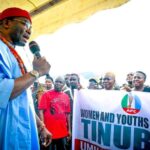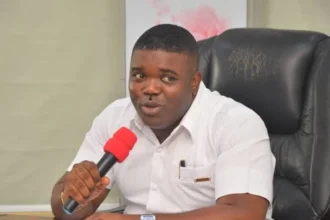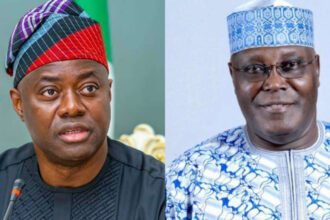
LAGOS, Nigeria — Fiery preacher and former presidential aspirant, Pastor Tunde Bakare, has declared that President Bola Ahmed Tinubu’s emergence as Nigeria’s leader is divinely ordained and cannot be undone by human effort. In a stirring sermon delivered during a Sunday service at The Citadel Global Community Church in Lagos, Bakare stated that only God has the authority to remove Tinubu from power, affirming the spiritual legitimacy of the President’s leadership.
“Whether you like it or not, Bola Ahmed Tinubu is the President of the Federal Republic of Nigeria,” Bakare declared to a packed congregation. “You didn’t put him there, and you cannot remove him. Only God can.”
The comment comes amidst growing political and economic tensions in the country, with the Tinubu administration facing criticism over its economic reforms, subsidy removal, and the rising cost of living. Yet Bakare, who has never shied away from controversial pronouncements, insisted that Tinubu’s leadership is a result of divine orchestration, regardless of public sentiment.
A Shifting Tone from a Longtime Critic
Bakare’s remarks have raised eyebrows across Nigeria’s political and religious circles. The pastor is widely known for his sharp critiques of successive governments, including that of former President Muhammadu Buhari, with whom he once shared the stage as a running mate in the 2011 presidential election under the Congress for Progressive Change (CPC).
In the buildup to the 2023 general elections, Bakare contested the All Progressives Congress (APC) presidential ticket, a race ultimately won by Tinubu. At the time, Bakare was one of the more vocal internal critics of the political process, and his presidential ambition was marked by bold declarations that he would one day lead Nigeria.
However, Sunday’s message marked a significant shift in tone. “Let it be known today, God rules in the affairs of men,” Bakare proclaimed. “He raises up kings and brings them down. If God put him [Tinubu] there, it is not your protest or your anger that will take him down.”
Divine Mandate or Political Endorsement?
Observers have been quick to interpret Bakare’s statement as either a spiritual justification of Tinubu’s administration or a political alignment by a once-critical voice. The implications are significant, as Bakare’s platform commands respect among many in Nigeria’s Christian community and urban middle class.
To some, his comments may be seen as lending moral legitimacy to a government that is increasingly under fire for its economic policies, inflationary pressures, and perceived insensitivity to the suffering of average Nigerians.
Bakare, however, made clear that his position was not one of blind loyalty but recognition of divine sovereignty.
“It is not about what man desires, it is about what God permits,” he said. “Whether for judgment, correction, or blessing, when God appoints a leader, He does so for a purpose.”
Reaction from Political Circles
Bakare’s sermon has sparked widespread reactions, with both praise and criticism pouring in from across Nigeria’s political spectrum. Some APC loyalists have welcomed the statement as a validation of Tinubu’s leadership, especially in the face of opposition challenges and calls for the President’s resignation due to economic hardship.
“It’s good to see Pastor Bakare acknowledge what we in the APC have always known: Tinubu’s rise was not accidental, it was divine,” said an APC chieftain in Lagos who requested anonymity. “Leaders emerge by destiny, not noise.”
However, critics of the administration see Bakare’s comments as tone-deaf and dismissive of the legitimate concerns Nigerians are expressing.
“Invoking God to silence dissent is both dangerous and irresponsible,” said Dr. Chidi Okeke, a political analyst and columnist. “Nigerians are suffering, and what they need is leadership that listens, not spiritual gaslighting.”
Constitutional Versus Divine Authority
Bakare’s statement also ignites an ongoing conversation about the tension between constitutional democracy and perceived divine ordination in governance. While religious leaders often comment on politics in Nigeria, critics argue that such remarks blur the lines between faith and civic responsibility.
Nigeria operates under a constitutional democracy where leaders are elected by the people and can be held accountable by the same. Analysts warn that presenting leaders as “irremovable” because of divine will undermines democratic principles.
“Let’s be clear: in a democracy, power belongs to the people,” said Dr. Amina Yusuf, a lecturer in political science at the University of Abuja. “Even if you believe in divine sovereignty, we must not ignore constitutional accountability. Suggesting that only God can remove a leader contradicts the essence of democracy.”
Bakare on Nigeria’s Current Crisis
Despite his endorsement of Tinubu’s divine mandate, Bakare did not shy away from acknowledging the harsh realities facing Nigerians today. He admitted that the country is in a “season of pain,” but encouraged the faithful to remain hopeful.
“Times are hard. I feel it, and you feel it,” he said. “But we must never lose sight of the fact that God is working something out through the chaos.”
He urged Nigerians to pray for their leaders rather than curse them, quoting Scripture to emphasize the importance of intercession.
“Pray for those in authority so that you may live peaceful lives. That’s what the Bible teaches,” he told the congregation.
Mixed Public Reactions
Outside the church, the public response has been sharply divided.
Some citizens, especially those aligned with the ruling party or those who share Bakare’s theological views, applauded the message as a call for national unity and patience.
“I believe God placed Tinubu there,” said Mrs. Clara Oladipo, a market trader in Lagos. “We need to pray and give him time. Things will get better.”
But many others were less forgiving.
“God didn’t vote Tinubu into power, Nigerians did—or at least INEC said so,” countered Yusuf Bako, a youth activist in Kano. “This country is suffering. People are hungry, and pastors are telling us to wait for God to intervene. That’s not leadership.”
The Broader Impact of Bakare’s Statement
Tunde Bakare’s voice carries considerable weight, both within religious circles and the broader intellectual community. His ability to frame national issues through a biblical lens often resonates with millions of Nigerians who blend their spiritual and civic identities.
But his latest remarks may challenge that balance, especially at a time when many citizens are demanding accountability, not appeals to divine mystery.
Whether one views his comments as an expression of faith or political appeasement, there’s no denying the influence such statements have on public opinion.
As Nigeria grapples with economic instability, political uncertainty, and widespread frustration, voices like Tunde Bakare’s play a pivotal role in shaping public discourse. His declaration that only God can remove President Tinubu adds a new layer to the already complex conversation around leadership, legitimacy, and accountability in Africa’s largest democracy.
But in a country where both faith and politics are deeply personal, it remains to be seen whether Nigerians will embrace his spiritual interpretation of Tinubu’s presidency—or demand more tangible, human answers to their growing list of challenges.






